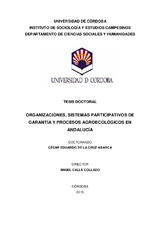Mostrar el registro sencillo del ítem
Organizaciones, sistemas participativos de garantía y procesos agroecológicos en Andalucía
| dc.contributor.advisor | Calle Collado, Ángel | |
| dc.contributor.author | Cruz Abarca, César Eduardo de la | |
| dc.date.accessioned | 2016-03-02T09:17:57Z | |
| dc.date.available | 2016-03-02T09:17:57Z | |
| dc.date.issued | 2016 | |
| dc.identifier.uri | http://hdl.handle.net/10396/13286 | |
| dc.description.abstract | Los Sistemas Participativos de Garantía son procesos sociales locales que surgen en diferentes partes del mundo porque se han vuelto una alternativa a la certificación por tercera parte. Los SPG generan alternativas al Sistema Agroalimentario Globalizado a través del desarrollo de mercados locales y canales cortos de comercialización. Este sistema de garantía fortalece la agricultura local y promueve el trabajo en red. Los SPG son construidos por organizaciones de productores y/o consumidores. Las organizaciones locales de SPG construyen redes que funcionan en escalas territoriales más grandes con la finalidad de alcanzar y dar soporte a sus objetivos. El objetivo de esta tesis es conocer que ha sucedido con los SPG en Andalucía desde su introducción en el territorio hasta la actualidad. Queremos saber cuál ha sido la relación entre los SPG, las organizaciones y sus procesos agroecológicos en todo ese tiempo. Trabajamos con cuatro organizaciones andaluzas, la asociación Biocastril, la asociación Ecovalle, la Red Agroecológica de Granada y la Federación Andaluza de Consumidores y Productores Ecológicos. Trabajamos con metodologías participativas y cualitativas. Hemos encontrado que todos los casos estudiados fortalecieron sus organizaciones al desarrollar sus SPG. Las organizaciones con mayor visión agroecológica son las que han asumido este sistema de garantía, lo han adaptado y mejorado a la realidad andaluza y han favorecido que se conozca y que se multipliquen las experiencias de SPG en Andalucía y España. Todas las organizaciones estudiadas, excepto Biocastril, han desarrollado sus SPG con recursos propios. La administración pública andaluza no está interesada en el tema. En nuestra opinión, las organizaciones han construido sus SPG en contexto adverso: una sociedad europea incrédula con este sistema, una administración pública que ha decidido no apoyar este tipo de garantía democratizada y una legislación desfavorable. Sin embargo, el movimiento agroecológico andaluz sigue desarrollando y multiplicando los SPG como un acto de empoderamiento y rebeldía frente al Sistema Agroalimentario Globalizado. | es_ES |
| dc.description.abstract | Participatory Guarantee Systems (PGSs) are local social processes that emerge in different parts of the world because they have become an alternative to the third-party certification. PGSs also generate choices to the Globalized Agri-food Business System through the development of local markets and short supply channels. These guarantee systems also strengthen local and traditional agriculture and promote social networking. PGS are usually built by farmers and consumers organizations. Local PGS organizations usually build networks that act on bigger territorial scales to support their objectives. The aim of this thesis is to know what has happened with the PGSs in Andalusia since their introduction in the territory up to the current date. We want to know which has been the relationship among PGSs, organizations and agro-ecological processes in all that time. We worked with four organizations Biocastril association, Ecovalle association, Granada Agroecological Network – RAG and Andalusian Federation of Consumers and Ecological Producers – FACPE. We used participatory and qualitative methodologies. We found that all the cases studied strengthened their organizations in the process of develop their PGS. Organizations with strong agroecological thought are those who have “captured” the PGS and have adapted and improved it to the Andalusian reality. They have spread this system in Andalusia and Spain. Currently the PGS are well known by persons and entities related to agroecology and organic farming in Andalusia and others Spanish regions. Except Biocastril, all the other organizations have developed their PGS with own resources. Andalusian public administration is not interested in the topic. In our opinion, these organizations have managed to develop their PGSs in an adverse context: an incredulous European society on this system, a public administration that decided not to help this kind of democratized guarantee and an unfavourable legislation. However, the Andalusian agro-ecological movement continues to develop and spread the system as an act of empowerment and rebellion against the Globalized Agri-food Business System. | es_ES |
| dc.format.mimetype | application/pdf | es_ES |
| dc.language.iso | spa | es_ES |
| dc.publisher | Universidad de Córdoba, UCOPress | es_ES |
| dc.rights | https://creativecommons.org/licenses/by-nc-nd/4.0/ | es_ES |
| dc.subject | Agroecología | es_ES |
| dc.subject | Sistema participativa de garantía | es_ES |
| dc.subject | Andalucía (España) | es_ES |
| dc.subject | Proceso agroecológico | es_ES |
| dc.subject | Transición agroecológico | es_ES |
| dc.subject | Agroecology | es_ES |
| dc.subject | Participatory Guarantee Systems | es_ES |
| dc.subject | Andalusia (Spain) | es_ES |
| dc.subject | Organizations | es_ES |
| dc.subject | Agro-ecological processes | es_ES |
| dc.title | Organizaciones, sistemas participativos de garantía y procesos agroecológicos en Andalucía | es_ES |
| dc.type | info:eu-repo/semantics/doctoralThesis | es_ES |
| dc.rights.accessRights | info:eu-repo/semantics/openAccess | es_ES |

